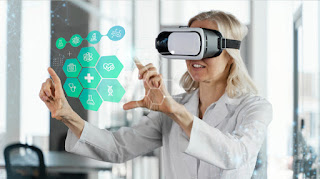Embarking on the Virtual Voyage: Revolutionizing Medical Education with VR
The COVID-19 pandemic unleashed a whirlwind of challenges upon the healthcare industry, forcing it to adapt swiftly and creatively to new circumstances. Amidst the chaos, one innovation emerged as a beacon of hope: virtual reality (VR). Once relegated to the realm of gaming and entertainment, VR has now found a new purpose in the field of medical education. In this essay, we embark on a journey to explore the transformative power of VR in reshaping how we train future healthcare professionals. Setting Sail: The Rise of VR in Medical Pedagogy Picture a medical student stepping into a virtual emergency room, surrounded by the sights and sounds of a bustling hospital ward. In this simulated environment, they are free to practice surgical procedures, engage in patient consultations, and navigate complex clinical scenarios—all from the safety of a VR headset. This is the promise of VR in medical education an immersive learning experience that transcends traditional boundaries. The ap...

.jpg)


